#dialectical materialism
Note
You can't call yourself a Marxist and be ideologically opposed to trans people, those are incompatible modes of thought.
gender identity theory is incompatible with the Marxist scientific method.
believing your thoughts determine your reality is a product of subjective idealism. Marxism is not idealism but dialectical materialism, there is an objective reality and objective material conditions from which human consciousness stems. we exist as material, physical beings rather than immaterial conscious spirits. subjective consciousness is subordinate to and dependent upon the material world.
the correct Marxist position is not "i feel i'm a woman therefore i am a woman" but "i am objectively female, and this makes me a woman".
#marxist feminism#marxism#gender abolition#gender identity#transgender#gender#dialectical materialism#marxism leninism#marxist leninist#marxist theory#original posts
697 notes
·
View notes
Note
do you know of any writing that is essentially "dialectics for dummys" (for want of a better term)? i feel like a genuine straightforward knowledge of what people really mean when they talk about dialectical anything is a barrier to my having a serious understanding of marxism.
marx for beginners, its like an illustrated book from the 70s, its a bit outdated but it gives a basic history of western philosophy important to understanding marx and has a section on dialectics and hegel.
if anyone has any better suggestions please tell me, this is just something i read years ago that helped me understand dialectical materialism. also on contradiction by mao is very good, it might be a little abstract if youre not familiar though
82 notes
·
View notes
Text
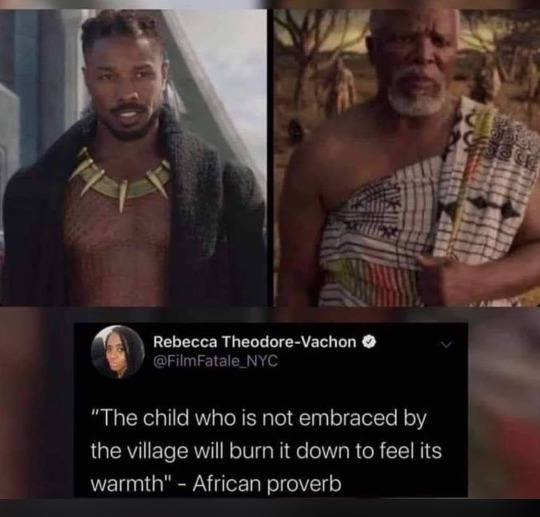
#united front#black panther#erik killmonger#marvel#mcu#marvel mcu#dialectical materialism#generational trauma
69 notes
·
View notes
Text
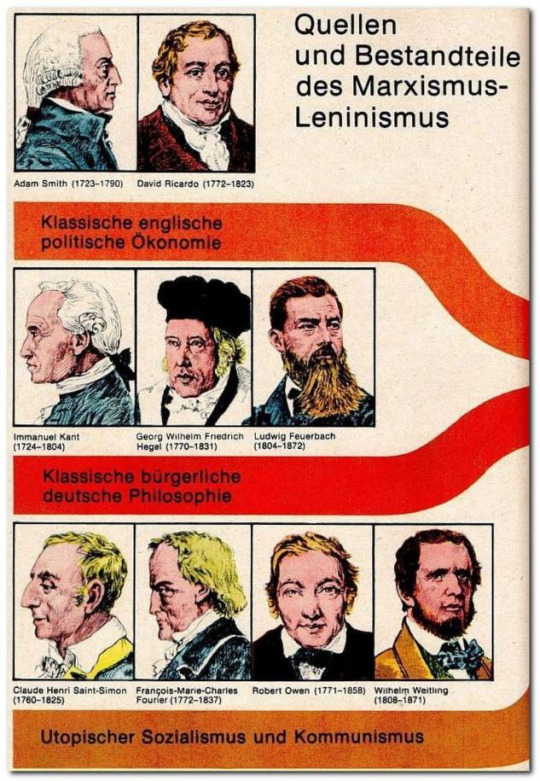
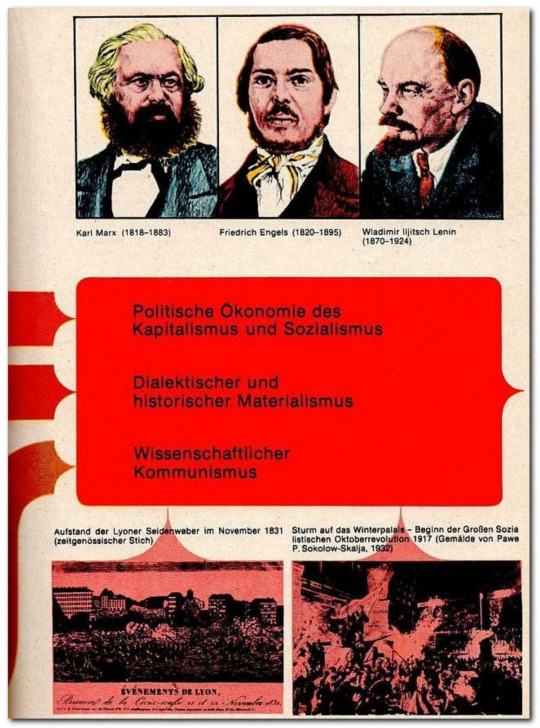
Sources and Components of Marxism Leninism
Classic English Political Economy ➡️Political Economy of Capitalism and Socialism
Classical bourgeois German philosophy➡️Dialectical and Historical Materialism
Utopian Socialism and Communism ➡️Scientific Communism
1975
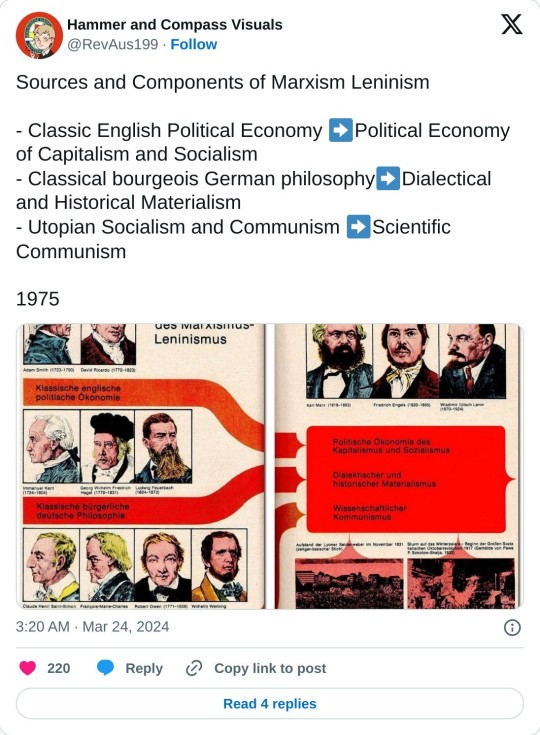
11 notes
·
View notes
Text
introductory excerpts on intercommunalism:
Introduction
Intercommunalism is an ideology which was adopted by the Oakland chapter of the Black Panther Party after its turn away from revolutionary nationalism in 1970. According to Huey P. Newton the development of intercommunalism was necessary "because nations have been transformed into communities of the world."[1] Intercommunalists believe that most forms of nationalism are obsolescent, because international corporations and technologically advanced imperialist states have reduced most nations down to a series of discrete communities which exist to supply an imperial center, a situation called reactionary intercommunalism. They also believe this situation can be transformed into revolutionary intercommunalism and eventually communism if communities are able to link "liberated zones" together into a united front against imperialism.[2] Intercommunalism is a lesser-known aspect of the Panthers' legacy as much of its development occurred at the height of the party's suppression and reorientation towards survival programs.[3][4][5]
Reactionary Intercommunalism
Newton believed that imperialism had developed into a stage of reactionary intercommunalism. Reactionary intercommunalism is typified by the development of a tiny community of elites with a monopoly on technology and state power within a single hegemonic empire (currently the United States).[15][5]
This 'ruling circle' is different from the Bourgeoisie, which the Panthers treated as a much broader phenomenon. Newton said that "[t]here are very few controllers even in the white middle class. They can barely keep their heads above water, they are paying all the bills, living hand-to-mouth, and they have the extra expense of refusing to live like Black people." The Black bourgeoisie in particular is a "fantasy bourgeoisie" which could be rallied to a revolutionary cause through sufficient education.[12]
The ruling circle's monopoly on technology and education is important to maintaining reactionary intercommunalism, as it prevents the rest of the world's communities from fulfilling their material needs independently of the center, leaving them dependent on the Empire for advancement.[15] The ruling circle uses 'peaceful co-optation' more often than military invasion to reinforce its aims.[5]
Reactionary intercommunalism allows for no independent national sovereignty, as the dominance of the global hegemon means that all nations bend to the 'weight' of its interests.[4] Instead nations have been reduced down to constituent communities, or "a small unit with a comprehensive collection of institutions that exist to serve a small group of people." Each of these communities "want to determine their own destinies," but can only do so by joining into a revolutionary bloc. All of the communities have no superstructure apart from global capitalism, and while they have different economic conditions they are all 'under siege' by the same forces.[15][4][5][10][9]
Newton believed that if allowed to continue, reactionary intercommunalism would bring more and more of the world's population into the lumpenproletariat, including white workers. However he did not think that this would end racism, in fact he thought white workers would increasingly blame their exploitation on minorities, especially the increasingly proletarianised third world.[5]
Revolutionary Intercommunalism
Intercommunalists believe that Revolutionary Intercommunalism will come about when communities are able to break the technological monopoly of the center. Through technology, communities would be able to solve material contradictions and "develop a culture which is essentially human." Even though the Panthers disavowed the nation-state as a viable form of revolutionary political struggle, they continued to support state socialist countries such as China, North Vietnam and North Korea against American Imperialism. Indeed, they were considered the vanguard of revolutionary intercommunalism through liberating territories and establishing provisional governments ahead of the global turn towards revolutionary intercommunalism.[16] However such states could still be co-opted into reactionary intercommunalism through the introduction of western markets.[5]
While the party no longer believed in Black nationalism, they continued to believe that Black Americans would play a special role within the struggle for revolutionary intercommunalism. Due to the Atlantic slave trade, Newton believed that Black Americans were the "first real internationalists" due to their mixed cultural origin and wide dispersal among a range of communities. Since he believed Black Americans constituted a significant force for revolution within the United States, and the destruction of the United States seemed to be a prerequisite for world revolution, the Panthers continued to view Black Americans as "the vanguard of the world revolution."[17]
Criticism
Intercommunalism was strongly opposed by some Black Panthers, especially those invested in the Party's strategy of forming internationalist alliances with foreign states. Cleaver denounced the Oakland chapter as the 'right wing' of the party for their rejection of guerrilla warfare. Assata Shakur was also critical of the theory's rejection of nationalism, saying that "The problem [with intercommunalism] was that someone had forgotten to tell these oppressed communities they were no longer nations." Others, like Mumia Abu-Jamal thought that intercommunalism was a terrible rhetorical strategy, as few understood the theory and many disliked Newton's public speaking. The differences over intercommunalism were also exacerbated by FBI wire-tapping and fake letters sent between the Oakland and Algiers sections of the party.[9]
#intercommunalism#communalism#black panther party#theory#marxist#leftist#dialectical materialism#black power#history#bipoc#united states#wikipedia
32 notes
·
View notes
Text
Bourgeois economists try to justify the existence of unemployment under capitalism by references to eternal laws of nature. This was the aim served by the pseudo-scientific fabrications of Malthus a reactionary British economist who flourished at the end of the eighteenth century and the beginning ‘of the nineteenth century. According to the “law of population” invented by Malthus, the population, from the very beginning of human society has increased in geometrical progression (as 1, 2, 4, 8, etc). but the means of subsistence, owing to the limitations of natural resources, have grown only in arithmetical progression (as 1, 2, 3, 4, etc.) This, said Malthus, was the fundamental cause of the existence of surplus-population and of starvation and want among the masses of the people. The proletariat, in Malthus’s opinion; can free itself from poverty and hunger not by abolishing the capitalist system but by abstaining from marriage and artificially restricting childbearing. Malthus considered wars and epidemics beneficial, since they cut down the working population. The theory of Malthus is profoundly reactionary. It is a means whereby the bourgeoisie justifies the incurable taints of capitalism. Malthus’s fabrications have nothing in common with reality. The mighty technique which mankind has at its disposal is capable of increasing the amount of means of life at rates which cannot be overtaken by even the fastest growth of population, But this is prevented by the capitalist system, which is the real Cause of the poverty of the masses.
political economy, part two: the capitalist mode of production, chapter IX: accumulation of capital and the impoverishment of the proketariat; the industrial reserve army. 1954
8 notes
·
View notes
Text
Ultra-left dogmatism and right-wing revisionism create and reinforce each other. Commandism and tailism create and reinforce each other. Centralist cults and ultra-democracies create and reinforce each other. To advance the struggle you must advance these contradictions, not just pick your favorite error.
#socialism#communism#Marxism#Marxist theory#democratic centralism#communist party#dialectical materialism#opportunism#dogmatism#revisionism#Marxism-Leninism#Maoism#Trotskyism#Left-Communism#commandism#tailism
14 notes
·
View notes
Text
Trigun - Inspired by the movie "Wise blood"?
(maybe the book too but havent read it)
Anyways, first I thought it would just be funny to point out some surface visual references of charachters which prolly are too generic to be proof of anything.


I mean ehh thats generic enough-

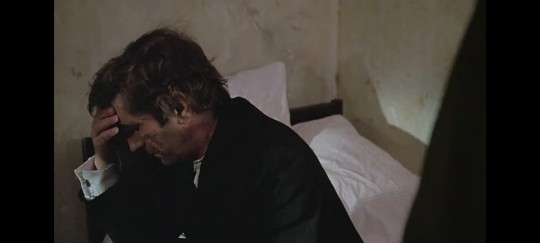
Well that too-


Well the hat and crazy eyes are there



Well the last more recalls Vash's own injurys

(think there is a scene in his Eriks disguise that match more)
But ok, one could say that this is as arbitrary as any other of my posts that dont deserve to be posted - Until I saw the full movie and got that there may be a deeper and more interessting connection
So trigun is know to have atleast Christian-adjasent themes and the author, even if never or not anymore Christian, seems to have a familiarity and interest with it that goes beyond the usuall japanese "wow cool crossess" and pop kabalah stuff (like NGE and shit or persona having all those occcult demon shit)
So what does it have to do with the movie? Well it is one exploring a theme that seems to be simmilar, even if Wise Blood presents it in a more macabre, black-humor, less sentimental and uplifting way
A world without God - or better said Christ/Love/Forgivness
Triguns whole point about Vash not killing anybody IS in the end an expression of the want of the world to be able to heal, to get better, to people to connect in a true way, of going beyond tricks and self serving rational scientfic interests
Thats why Knifes is kinda a representation of cold, uncarring survival of the fittest, of evolution, of the rule of superior beings by force and cold calculation and deception.
To make a parralel to the movie, it shows a man who cant see Christ, the power of redemption of something beyond himself and his own interests and striving - even if he feels justified by partly believing the things he rejects.
But in the end without them, it becomes a self fullfiling prophecy - his "Church without Christ" - without healing of the blind and resurection, without redemption - it condems him to that, making him blind and dead, and his atempts at repenting for killing some guy for a petty reason futile - not even being able to recupareta the love he gets from a landlady.
The theme of a fake preacher is then what is reflected in Wolfwood in Trigun, who is also just a killer, trained by another one, who can in the end find redemption in death and doing the right thing, even if it has a tragedy to it.
And in a way that illuminates Vash's whole journey more, why he couldnt give up and why it was important for him to find love and not become a more suffisticated monkey in a zoo who's hand only his brother would want to shake...
And thats why Vash not killing is actually cool and good and not stupid - cause of a random movie that butchered a book that prolly was tottally different.
But why the self.depreciation? Isnt apreciating the world and creation, "art", not a dialog, a call and response of unlikely meetings?
If not: Yeah...Sorry
#trigun#wise blood#wiseblood#christianity#analysis#comparison#thematic comparison#dialectical materialism#yeah...sorry#didnt read the book so sorry if that would make more sense#anyways interesting movie#for a moment you think its gonna be a corny oh bad people help each other movie but nah lol#also funny but also sad#and shows how many old gems there are I and most others havent seen#also yeah I wanna quit social media as I said but this was too interesting to not share even if I alone care lol#but trying again even if I fail after two days like allways lol pray for me post-ironically
7 notes
·
View notes
Text
I’ve been struggling to grasp an understanding of dialectical materialism but I think this morning I had a breakthrough thanks to a really great video by Luna Oi on YouTube.
Part of why I did not get it, was because it kind of aligns with the way I view that world already and so I felt like I was missing the the point.
Science works because it understands that a single person is prone to error and bias. We have to work to prove ourselves false and only when we fail to do that is when we are moving closer and closer to the truth. This can not be done by individuals. We have to work together to keep each other in check and focused!
This is mirrored in dialectics. We have to work together understand the world, and then debate problems to move closer and closer to solutions.
I still have a lot to learn. While the ideas are beginning to stick, the investigation has just started.
17 notes
·
View notes
Text

YESSSSSS
40 notes
·
View notes
Text
youtube
Approaching Marxism is an educational series providing introductions to core Marxist concepts, their ambiguities and development, and the debates that they have spawned since. In this episode, we take a look at Marx's theory of the metabolic rift, its articulation through the work of the second-wave of contemporary western ecosocialist thought (particularly in the work of John Bellamy-Foster), the importance of this theory in disputes between first-wave and second-wave modern ecosocialist thought, and more recent disputes over the dialectics of nature.
We are very happy to say that Jason W. Moore, author of Capitalism in the Web of Life and co-cordinator of the World Ecology Research Network contributed to this episode's coverage of debates over the dialectics of nature. Moore also recently appeared on the Prolekult podcast.
#marxism#leftism#politics#communist#socialism#communism#philosophy#theory#youtube#ecology#metabolic rift#john bellamy foster#jason w moore#ecosocialism#dialectical materialism#dialectics of nature#nature#Youtube
8 notes
·
View notes
Text

Okay, we won’t buy things
#comics#comic#cartoons#cartoon#memes#meme#materialism#capitalism#poverty#fascism#consumerism#consumerinsights#eat the rich#eat the fucking rich#ausgov#politas#auspol#tasgov#taspol#australia#fuck neoliberals#neoliberal capitalism#anthony albanese#albanese government#antiwork#anti slavery#corporate greed#greedy bastards#fuck corporations#dialectical materialism
5 notes
·
View notes
Note
i read somewhere that marxism has limitations because its a science, so what are some of these limitations?
I honestly am not sure what this might mean. Certainly Marxism is known as the immortal science. I think this is nigh unilaterally held as a conceit.
Generally, the (misguided) arguments of detractors rely on the absurd notion that Marxism, communism, socialism, only function in theory, that they supposedly lack empirical precedents or pragmatic applications. This is of course false, as communism was one of the dominant political and economic systems at work throughout the Twentieth Century, when it already had antecedents in the likes of e.g. the Paris Commune, and indeed many Marxist infrastructures remain extant and prosperous today (see Cuba's recent leaps in LGBT+ legislation and China's effective covid policy). And socialism with Chinese characteristics definitely emphasises the scientific basis of Marxism far more than just the utopian, though this obviously goes all the way back to Marx & Engels themselves.
As Mao noted to the inaugural meeting of the Natural Science Research Society of the Border Region:
Natural science is one of man's weapons in his fight for freedom. For the purpose of attaining freedom in society, man must use social science to understand and change society and carry out social revolution.
This can be seen as expanding and modulating on Engels’ observation:
politics is the science of production, and foretells the complete absorption of politics by economics. [...] To make a science of Socialism, it had first to be placed upon a real basis.
And this is not even addressing e.g. chapters 7 and 16 of Capital (Vol.1), which discuss the material reality of labour and how all production is derived from natural laws.
What I'm curious about is what the alternative would be to science? What branch of theory or epistemology is unencumbered by limits? Surely not the humanities? But social sciences themselves are conventionally considered humanities anyway. Indeed, Marx was primarily an economist (along with Bukharin, Luxemburg, Harvey, etc.), and for that matter was also a noted poet (along with Mao, Neruda, Senghor, etc.), so it's not as if Marxist principles are limited to hard science. We could also consider the likes of Oscar Wilde, Bertolt Brecht, Frida Kahlo on one hand, and Albert Einstein, Bertrand Russell, J.D. Bernal on the other; the spectrum of Marxist visionaries unsurprisingly spans an array of disciplines.
But generally I encounter a greater, not a lesser, demand for empirical scientific basis to political principles, often disproportionately levied against the left by fash liberals and ‘centrists’ who are either ignorant or in denial about the practical reality of Marxist advances throughout modern history.
All this puts me in mind of Fred Hampton:
We’re not metaphysicians, we’re not idealists, we’re dialectical materialists. And we deal with what reality is, whether we like it or not.
And it is true that this is where Marxism shines brightest. In the face of oppressive capitalist modes of production, whether we’re talking about covid, LGBT rights, mass transport infrastructure, practical concerns of labour, mental health, or climate change, it is Marxist principles of self-determination, emancipation, and solidarity, whether utopian or scientific, which pierce the darkness of our present predicament as a beacon to guide us toward the dawn, that we might see the sun shine evermore.
#Marxism#Karl Marx#Marxist#Marx#Friedrich Engels#Engels#Mao#Mao Zedong#Fred Hampton#dialectical materialism#ask#original
54 notes
·
View notes
Text
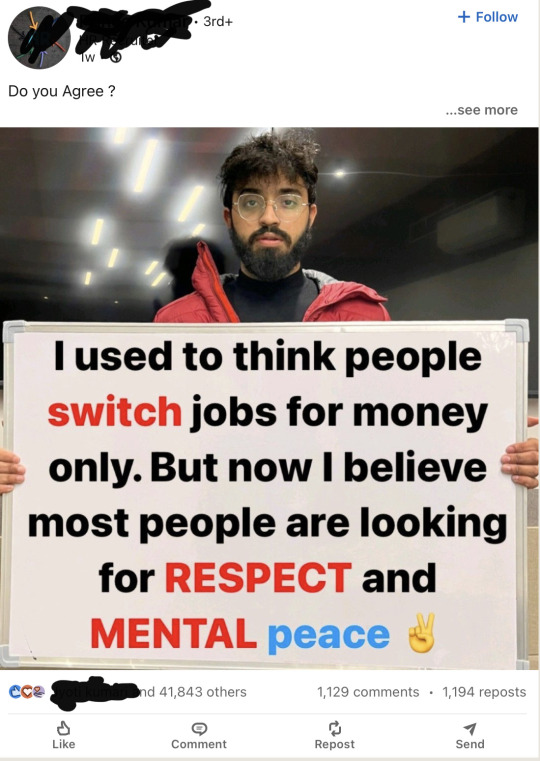
yes, and in today’s capitalist hellscape respect and mental peace can come from getting paid enough money. also like some people will never have the luxury of working of job that provides them these things
#linkedinsanity#leftist#marxism leninism#socialism#communism#dialectical materialism#marxist leninist#right wing bullshit#leftist memes#anti capitalism#anti capitalist
44 notes
·
View notes
Text
Why can't a circle self-identify as a square? Is there not some kind of shape fluidity between circles and squares? Are they not fundamentally the same? They all fundamentally consist of area. Why do we differentiate between them at all? Why has humanity worried to define objects as green or blue?
Is there a material reality? There are those who will argue there is no material reality; we are not among them. That is not a Marxist concept.
....
It's the ultimate idealism isn't it? Idealism in the philosophical sense that "the material world doesn't exist"; "it's whatever I think that is most important". So actually, by that rationale, ideas are prime and matter will have to conform with my ideas, and the ultimate result is this kind of solipsism where you are alone in the world — the lone conscious force and the ultimate determiner of your own reality without reference to other people or the material reality of the word's environment around you.
Morally, it means whatever you want subjectively is right and correct. So it can be used to justify doing anything, committing any crime against anyone.
As a philosophy it is totally isolating, and totally gets rid of the idea, as the previous speaker was saying, of having things in common, uniting on a class basis around the real things that oppress us; real material and economic phenomena.
On Gender Fluidity — from thecommunists.org
#gender#gender abolition#marxism#dialectical materialism#trans#transgender#trans day of visibility#communism
3 notes
·
View notes
Text
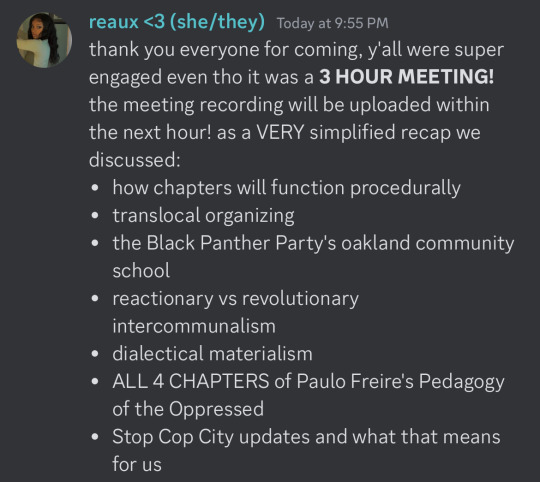
BFP just had a wonderful meeting and we talked about so many things! if you wanna be involved in conversations like these and help us start IN-PERSON, GLOBAL LIBERATION SCHOOLS, beginning with Washington, DC, New Orleans, LA, and Sydney, NSW, Australia (yep, that’s the big news we’ve been hiding), join our discord server (link in bio)! any and all ages/walks of life are welcome, but our main focus is on middle school through university-aged youth, esp youth of color!
i’m so excited to work with y’all :D
image description below
[ID: Screenshot of Reaux’s text message in Discord: “thank you everyone for coming, y'all were super engaged even tho it was a **3 HOUR MEETING!** the meeting recording will be uploaded within the next hour! as a VERY simplified recap we discussed:
- how chapters will function procedurally
- translocal organizing
- the Black Panther Party's oakland community school
- reactionary vs revolutionary intercommunalism
- dialectical materialism
- ALL 4 CHAPTERS of Paulo Freire's Pedagogy of the Oppressed
- Stop Cop City updates and what that means for us”
/End ID.]
#reaux speaks#discord server#intercommunalism#black panther party#bipoc#anti capitalism#anarchism#communism#socialism#paulo freire#pedagogy of the oppressed#organizing#australia#sydney australia#new orleans#washington dc#dialectical materialism#stop cop city#atlanta#abolition#educational equity
17 notes
·
View notes